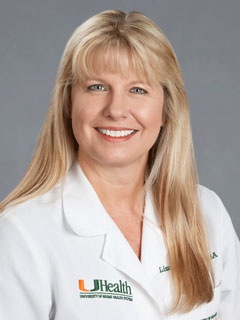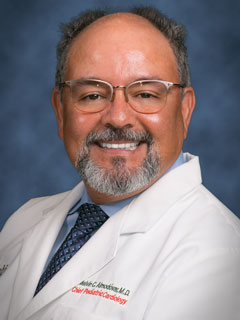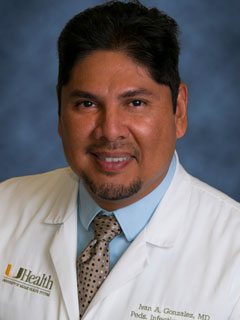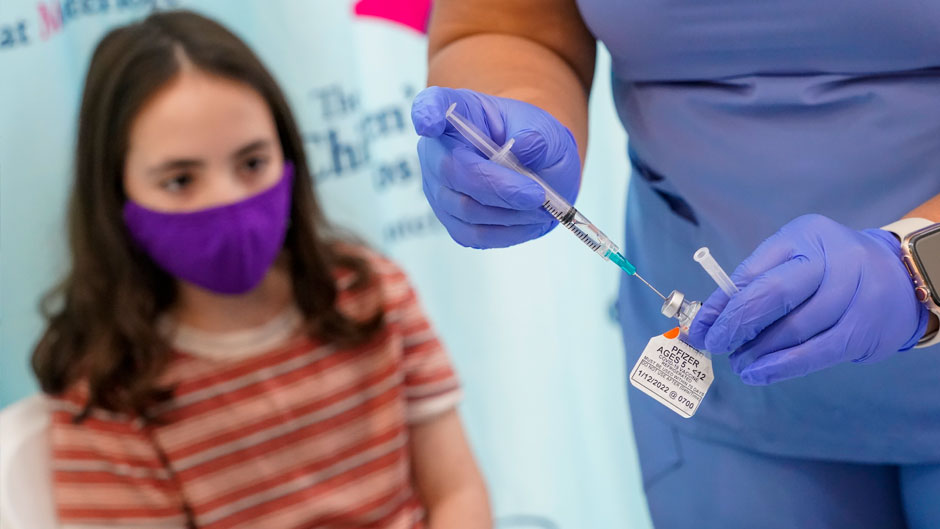After close to a year of waiting, children ages 5 to 11 can now get vaccinated against COVID-19.
And three University of Miami pediatricians hope that parents and guardians will take advantage of the vaccine soon, so their children can be fully protected before the Christmas holiday.
“This vaccine will bring the infection rates down lower, and it will reduce the spread of the virus to keep kids in school,” said Dr. Lisa Gwynn, an associate professor of pediatrics and public health at the Miller School of Medicine, as well as interim division chief of child and adolescent health in the Department of Pediatrics. Gwynn also directs the Pediatric Mobile Clinic, which offers free COVID-19 tests and vaccines, along with all school vaccinations, to children across Miami-Dade County. “It also means we can get back to normal sooner, with less of a risk of people getting infected and dying.”

Dr. Melvin Almodovar, who is chief of pediatric cardiology at the Miller School, said he would also recommend the vaccine to his patients.
“Vaccination remains the key to preventing the acquisition and spread of COVID-19, or severe illness and possibly death in children who acquire the infection,” said Almodovar, who also directs the Children’s Heart Center and Cardiac Intensive Care Unit in the Department of Pediatrics and Holtz Children’s Hospital. “It may also help reduce the impact of active, primary COVID-19 infections and associated conditions, like multisystem inflammatory syndrome (MIS-C).”
With the support of the U.S. Food and Drug Administration and the U.S. Centers for Disease Control and Prevention (CDC) last week, children who are 5 years old and older can now roll up their sleeves and get the two-dose Pfizer-BioNtech vaccine. Gwynn, who is also president of the Florida chapter of the American Academy of Pediatrics (AAP), said pediatricians across the state are downright “giddy” about the news and cannot wait to get the vaccine in their offices.
“We’re thrilled,” she said. “We knew it was coming, and the trials look promising for the babies too. So, we are looking forward to that.”
Like adults, children will get their Pfizer shots three weeks apart. They will not be fully vaccinated until two weeks after the second injection. But the pediatric vaccine is also slightly different from the original version. For example, the pediatric vaccine is a third of the potency of the adult vaccine, and it is compounded differently. Yet, that does not mean it will not offer a similar protection as the adult vaccination, according to Gwynn. In trials, the vaccine was 90.7 percent effective at preventing symptomatic COVID-19, news reports state.
“Kids immune systems are more reactive, so they don’t need as much vaccine to stimulate the immune response and to produce antibodies to fight off this virus,” Gwynn said.
Still, because of the differences in preparation, and its emergency use status, the federal government decided the pediatric COVID-19 vaccine will only be available at pharmacies, clinics, and in pediatrician’s offices. The University will be getting its share of the vaccine from the Florida Department of Health this week, and it will start distributing it on Monday, Nov. 15, through the Pediatric Mobile Clinic, the Shotz-2-Go van, at school clinics, and at the University’s pediatric practices.

The availability of a vaccine for this younger population will give pediatricians a new tool to combat COVID-19. Although the novel coronavirus primarily affected older individuals at the start of the pandemic, pediatricians saw an increase in child and teen COVID-19 cases last winter, and then during August and September from the highly contagious Delta variant. AAP reports indicate that more than 6 million U.S. children have contracted COVID-19 throughout the pandemic, representing 16.6 percent of all cases. Nearly 800 children and adolescents have died from COVID-19, with 173 in the 5 to 11 age range, the CDC reports. Dr. Ivan Gonzalez, associate professor of clinical pediatrics, said that he thinks the vaccine will be especially helpful for parents and guardians with children who are immunosuppressed, those with chronic diseases, or who are obese and are therefore at risk for severe COVID-19.
“A lot of the kids we are seeing in the hospital today are in that age group (5-11) and they could not get vaccinated before,” said Gonzalez, who also leads the training program for pediatric infectious diseases in the Division of Infectious Diseases and Immunology at the Miller School. “Others decided not to get vaccinated, or they had conditions that would make them more susceptible to COVID-19. So hopefully, with the vaccine, we will see fewer hospitalizations in this age group.”
Evidence also indicates that the vaccines help lower the transmission of COVID-19. So, if young children get the vaccine, it could also protect immunocompromised family members and others at risk for severe disease, Almodovar pointed out.
Despite the concerns about possible side effects, University pediatricians also say that the risk of anything more severe than some soreness at the injection site, a headache, or some fatigue are extremely low. While many are worried about myocarditis, an inflammation around the heart that has affected some adolescent boys who received the vaccine, the physicians say the condition is very treatable and that none of these teens have died from it.
“Kids are 10 times more likely to get severe COVID-19 or multisystem inflammatory syndrome (MIS-C) from being unvaccinated than getting a side effect like myocarditis from the vaccine,” Gonzalez said. “And when you get complications from a COVID-19 infection, those complications last for a while and kids have trouble breathing, sometimes for up to six weeks.”
Gonzalez also noted that the vaccine is coming at a time when public schools are starting to relax their mask mandates in upper grades. If these rules trickle down to elementary schools, Gonzalez said that vaccinating children may be the best option to protect children from getting COVID-19 or spreading the dangerous illness to others. Last week, because of low infection rates in the community, Miami-Dade County Public Schools began allowing middle and high school students to opt out of the mask mandate, and Broward County allowed high school students to opt out of masks a few days before that.

“The timing is really crucial right now,” he said. “As mask mandates are relaxed, and people gather for the holidays, there’s a potential for lots of kids to get infected. But if they get vaccinated, they can develop immunity and get protection against the disease. So they are not at risk for getting a severe COVID-19 infection.”
Gwynn and Gonzalez agreed that the larger challenge will be convincing parents and guardians that the vaccine is safe because of all the misinformation swirling—often fueled by social media. Polls indicate that up to 60 percent of parents and guardians either want to wait or would not consider vaccinating their 5 to 11-year-old children. But the pediatricians hope that opinions will change as the positive effects of these vaccines are highlighted.
“There’s no reason to wait and see. We need to protect kids now,” Gwynn said. “These vaccines are safe and effective and have gone through all the rigorous standards of evaluating a vaccine. We trust the science, and we hope parents will trust it too, and have those discussions with their pediatricians.”
To get a vaccine through the University’s Pediatric Mobile Clinic or at its Shotz-2-Go van, check the schedule to see where they are located each day.

